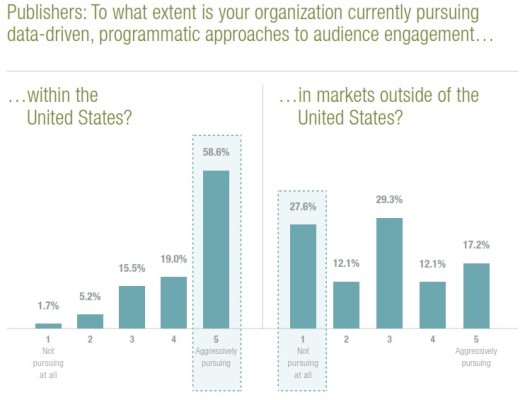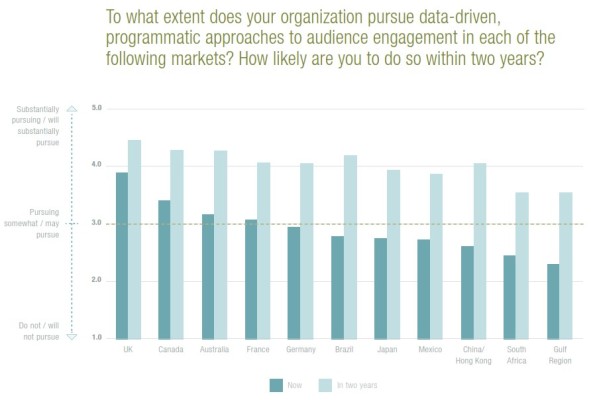IAB Study Looks At Programmatic’s Global Expansion Opportunities
While the United States has seen programmatic audience development — the practice of automating digital advertising sales based on audience data — surge over the past few years, publishers and ad tech companies are eying global markets for opportunity. A new survey and whitepaper from the Interactive Advertising Bureau and Winterberry Group looks at the […]

While the United States has seen programmatic audience development — the practice of automating digital advertising sales based on audience data — surge over the past few years, publishers and ad tech companies are eying global markets for opportunity. A new survey and whitepaper from the Interactive Advertising Bureau and Winterberry Group looks at the developments and roadblocks of programmatic’s expansion in markets around the world by US based companies.

Nearly all of the large American publishers that participated in the survey (98.3 percent) are currently engaged in programmatic marketing strategies for audience development in the U.S. Yet, abroad, participation among these publishers drops to 72.4 percent. That said, publishers that participated in the survey said they plan to expand their programmatic marketing efforts to more markets and branch out beyond the UK, Canada and Australia to larger markets, namely China and Brazil, over the next two years.
Though only 13.7 percent of U.S. and U.S.-based global survey respondents said they’re actively engaging in programmatic audience development in Brazil today, 39.1 percent expect to do so within two years—with 32.6 percent saying they expect to pursue opportunities in the Brazilian market “substantially.”

Advertising technology service providers, too, are extending their presence abroad. Over half (56.6 percent) of respondents said they’re actively building programmatic audience development capabilities outside of the U.S. More than half of those said they are “aggressively” pursuing international markets.
The number one barrier to entry in international markets, according to the respondents, is a general “lack of understanding of audience development”, followed up by doubts over whether adequate scale can be achieved through programmatic solutions in new markets.

The Winterberry Group conducted interviews with 45 executives across the programmatic ecosystem, including publishers, marketers, agencies, and service and technology providers and surveyed more than 145 US IAB members for the study.
Over half (52.4 percent) of survey respondents cited “third-party data availability” as the top consideration when assessing a new market.
“There is so much audience information available in the U.S., but that’s not the case elsewhere. When you expand to other countries there is no data control processes—so clean, quality data just doesn’t exist to the same extent. It makes expanding into regions really difficult when data is sparse,” an Interactive Marketing Strategist from a US based global shipping provider told an interviewer.
The availability of suitable programmatic technology is also a key consideration when identifying regions to build new media properties and expand audience development efforts.
Publisher and advertisers panelists identified the following seven criteria for determining whether a market is ripe for expanding programmatic audience development efforts:
- Embrace of the Audience: an orientation on “audience development”—the use of data to identify and maintain persistent engagement with consumer populations based on specific target attributes—as a foundation of the advertising, marketing and/or media strategy
- Programmatic Know-How: an understanding of how business needs drive the adoption and evolution of specific programmatic marketing use cases, including those linked specifically to the media transaction (e.g. “open market RTB,” “private marketplace,” etc.) and those that apply the same automation tools and processes to broader business purposes (e.g. “customer analytics,” “marketing attribution,” “media mix modeling,” etc.)
- A Transparent, Open Market Culture: a free and fair marketplace for transacting business, receptive to new entrants—including those founded elsewhere
Data, Data, Data: the availability of third-party audience data (and legal ability to transact the same through responsible, consumer-friendly means) - Technology—and the Means to Use It: the availability of the platforms, tools and applications—either homegrown or licensed from elsewhere—upon which audiences are identified and developed (as well as the expertise to leverage the same)
- Standards in Measurement and Accountability: a commitment to develop and maintain universal standards to govern audience identification, measurement and valuation across the marketplace, including reliable legal and self-regulatory protections against fraud and
other adverse effects; and - An Opportunity to Build Scale: an audience population that, either independently or as aggregated with those from other markets, offers a meaningful opportunity to drive value for all parties to the media transaction.
Contributing authors are invited to create content for MarTech and are chosen for their expertise and contribution to the martech community. Our contributors work under the oversight of the editorial staff and contributions are checked for quality and relevance to our readers. MarTech is owned by Semrush. Contributor was not asked to make any direct or indirect mentions of Semrush. The opinions they express are their own.
Related stories
New on MarTech